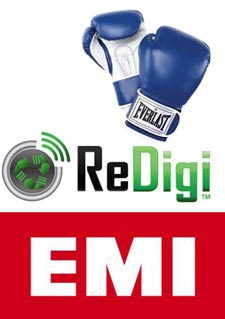
 New website, redigi.com, which purports to create a marketplace to buy and sell new and previously owned digital files is getting a lot of attention. Unfortunately, it is the type of notoriety that involves courts, lawyers , judges and large legal budgets. The site had barely opened its doors last Fall when the Recording Industry Association of America (RIAA) sent a cease and desist letter accusing it of copyright infringement. In January, Capitol Records filed a complaint, which it then followed up with a request for a preliminary injunction that would prevent redigi.com from re-selling any of Capitol’s previously purchased music content. Redigi.com filed a request for a summary judgement to dismiss the case. At question is whether redigi.com is protected under the first-sale doctrine which gives people with lawful possession of copyrighted material the right to sell it, an area of the copyright law which remains somewhat undefined with respect to digital files.
New website, redigi.com, which purports to create a marketplace to buy and sell new and previously owned digital files is getting a lot of attention. Unfortunately, it is the type of notoriety that involves courts, lawyers , judges and large legal budgets. The site had barely opened its doors last Fall when the Recording Industry Association of America (RIAA) sent a cease and desist letter accusing it of copyright infringement. In January, Capitol Records filed a complaint, which it then followed up with a request for a preliminary injunction that would prevent redigi.com from re-selling any of Capitol’s previously purchased music content. Redigi.com filed a request for a summary judgement to dismiss the case. At question is whether redigi.com is protected under the first-sale doctrine which gives people with lawful possession of copyrighted material the right to sell it, an area of the copyright law which remains somewhat undefined with respect to digital files.
Declaration of Redigi head John Ossenmacher in opposition to preliminary injunction motion
Capitol Complaint Against Redigi.com File Jan. 6, 2012
Google also weighed into the discussion last week and submitted an application for permission to file an amicus curiae (friend of the court) brief in support of neither party, saying, “While Google takes no position on the ultimate merits of this case, it has a specific and vital interest in the legal doctrines underpinning the ‘cloud computing’ industry. Cloud computing enables users to store and process data remotely, in the ‘cloud’ of networked computer servers connected through the internet to the user’s computer, thus freeing users from the need to keep physical files and process data locally with their own hard drives and powerful computers. The continued vitality of the cloud computing industry—which constituted an estimated $41 billion dollar global market in 2010—depends in large part on a few key legal principles that the preliminary injunction motion implicates… A premature decision on incomplete facts could create unintended uncertainties for the cloud computing industry.”
The court denied Google’s request essentially saying its input was not needed.
ReDigi sells music downloads for 79¢ per song and users get a 20¢ coupon for each song they upload so consumers swapping music actually pay only 59¢ per song after figuring in the coupon discount. “ReDigi is a marketplace that gives users tools to be in compliance with copyright law,” says ReDigi head John Ossenmacher. “Before I put a file up for sale ReDigi says you will need to delete them, and if not it won’t take them.” The company also has plans to resell e-books. According to the web site, “Only tracks purchased from legal download sites such as iTunes, etc. are eligible. Once you buy songs on ReDigi, you can sell them back at any time! Store your music in our FREE cloud. When you’re done listening to them, sell them back with the click of a button.” Also mentioned on the site are payments to artists and labels. “The musician and label get a percentage of every sale, often netting more than they get from a new music site and a lot more than they get from streaming music.” However, numbers are not mentioned.
A ruling from the court is expected soon.

Category: Featured, Label, Sales/Marketing
About the Author
Journalist, entrepreneur, tech-a-phile, MusicRow magazine founder, lives in Nashville, TN. Twitter him @davidmross or read his non-music industry musings at Secrets Of The ListView Author Profile


